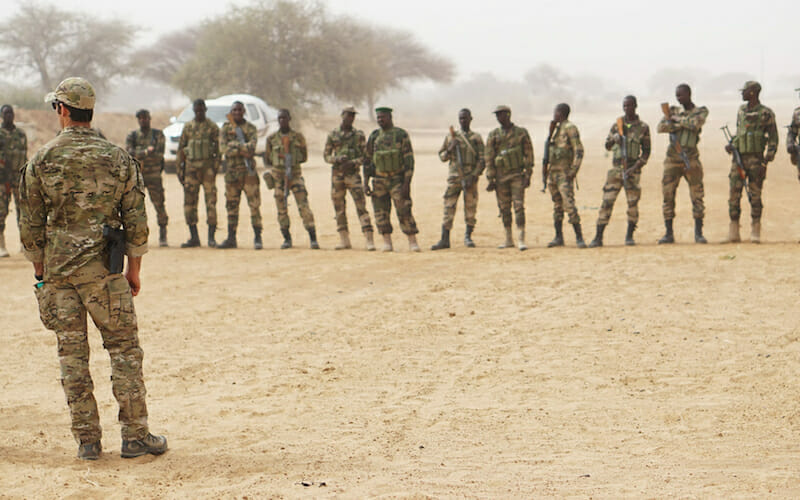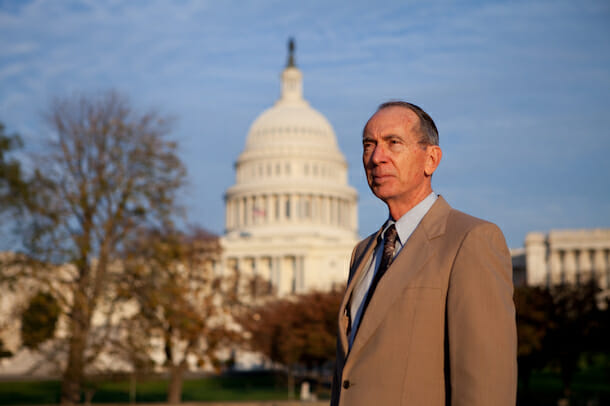
On U.S.-Africa Relations: Interview with David Shinn
Ambassador David Shinn (@AmbShinn) is a former senior US diplomat who served in the US State Department for more than 30 years with different assignments including Ambassador to Ethiopia and Burkina Faso. He is an adjunct professor of International Affairs at the Elliot School of International Affairs at George Washington University. Shinn frequently provides commentary on the ongoing political and security issues in Africa and the US policy in the region. His current research focuses on Sino-African relations
I interviewed David Shinn about the US policy in Africa under President Donald Trump, China’s expanding influence in Africa and how that affects the US presence in the region and the security of the Horn of Africa which is experiencing a new era of militarization by regional powers in the Middle East, like Saudi Arabia, the UAE and Turkey.
After 16 months in office, President Trump has recently appointed Tibor P. Naggy to become the US Assistant Secretary of State to Africa. While a number of analysts argue that Trump’s foreign policy is not very interested in Africa, the US National Security Strategy that was published in December last year stated that “Africa contains many of the world’s fastest growing economies, which represent potential new markets for US goods and services.” During the Trump-Buhari meeting in the White House last month, they both discussed expanding economic and commercial ties between the two countries, as Nigeria is Africa’s largest economy. Does that mean that the US policy towards Africa is shifting from humanitarian aid to trade and investment? In addition, if confirmed by the Senate, how do you think Ambassador Naggy will reshape the US policy towards Africa?
I do not believe that the Trump administration is backing away from humanitarian aid (food and emergency assistance) to Africa, but it does seem to be in the process of reducing development aid. The goal is to replace some development assistance with trade and investment. The problem is that the U.S. government does not control trade and investment; it is largely determined by the U.S. private sector and global economic forces. The only significant weapon that the U.S. government has to encourage trade and investment is funding from the Export-Import Bank (EXIM). Since 2009, EXIM has supported about $6.6 billion in transactions throughout Sub-Saharan Africa. When annualized, this is a modest sum and the Trump administration has shown no inclination so far to encourage more funding for EXIM.
U.S. policy towards Africa has demonstrated considerable continuity since the end of World War II, even when a Republican administration replaces a Democratic one. I expect this trend to continue. Tibor Nagy is a retired Foreign Service professional who knows the continent well and has worked for both Republican and Democratic administrations. The Trump administration has already indicated its intention to continue support for the Africa Growth and Opportunity Act (approved during the Clinton administration), The President’s Emergency Plan for AIDS Relief (the Bush administration), and Power Africa (the Obama administration). Each new administration adds its own initiatives; it is too soon to predict what Ambassador Nagy will recommend.
In December 2017, The US National Security Strategy published under President Trump classifies Russia and China as ‘revisionist powers’ that pose a threat to the United States. Another strategic document that was issued under President Trump, the National Defence Strategy designates China as a ‘strategic competitor’ to the United States. Beijing’s investment in Africa increased rapidly for the last two decades, so how does the new complex and challenging great power competition among the US, China and Russia affect the security and the political stability in Africa?
The role of the United States and China in Africa should not be seen exclusively as one of competition. In all international relationships with Africa, there is competition for commercial gain in trade and investment. This applies equally, for example, to U.S. interaction with France, the UK and Germany. In the case of China, there is added competition for influence, especially whether African countries choose to follow a form of governance that looks more like Western liberal democracy or China’s top down approach, which permits far less freedom for individual expression of views. U.S. and Chinese goals in Africa are surprisingly similar. Both countries seek political stability and economic development. To this end, both countries have already cooperated in UN peacekeeping operations, efforts to resolve conflict in places like South Sudan, and combating piracy in the Gulf of Aden. I anticipate that selective cooperation will continue under the Trump administration.
Since the War of terror started in 2001, the epicenter of the US policy towards Africa was countering terrorism by supporting the military and security apparatus of the continent along with drone strikes to target senior terrorist leaders in across the continent. The recently published US National Defence Strategy called ‘inter-state competition, not terrorism, is the primary concern of the United States.’ How would the new strategy affect the war on terror in Africa, while it is not the primary priority for Washington? (While there is a massive increase in the US defence budget for 2018 and 2019).

The 2018 U.S. National Defense Strategy stated, “Inter-state strategic competition, not terrorism, is now the primary concern in U.S. national security.” This is a significant change for U.S. global security policy but probably has limited meaning for Africa. The National Defense Strategy goes on to say that in the case of Africa, the United States “will bolster existing bilateral and multilateral partnerships and develop new relationships to address significant terrorist threats that threaten U.S. interests and contribute to challenges in Europe and the Middle East.” The United States will work with local partners and the European Union to degrade terrorists, build capacity to counter violent extremism, and limit the malign influence of non-African powers. The latter may be a reference to China and Russia. My main point is that in the case of Africa counterterrorism remains one of Washington’s main concerns, if not the major one.
The US Department of Defence recently accused China of using non-lethal weapons to interfere with the US military planes in Djibouti while Americans pilots suffered minor injuries caused by the Chinese lasers as the Pentagon argues, although Beijing denied the Pentagon’s claim. The American and Chinese forces in Djibouti are close to each other and there are military tensions between the two countries in the South China Sea. If these incidences occur again, as Washington eyes Beijing as a strategic competitor, how do you think retaliation from the US would affect the stability of the region?
There does not seem to be any doubt, as stated by a Pentagon spokesperson, that high-grade lasers have been used against American pilots in Djibouti. The spokesperson said the Pentagon was confident that Chinese nationals were responsible. A spokesperson from China’s Foreign Ministry denied any Chinese involvement in the laser attacks. There is an element of doubt as to the source of the attacks. If China is, in fact, behind the attacks it will significantly worsen the relationship between the United States and China in the region and make it much more difficult to find areas of cooperation. I doubt, however, that it would have any significant impact on wider regional stability.
Since the Saudi led coalition attacked Yemen in 2015, the Horn of Africa is experiencing a new era of militarization by both major and regional powers. Some of these powers have their own suspicions about each other like the US and China, the UAE and Turkey and so on. In addition, the GCC crisis had an impact on the Horn of Africa, as the Saudi led coalition and Qatar both sent delegations to the region to seek support and expand their sphere of influence. So how would that affect the fragile security in the Horn of Africa in the long-term?
Saudi Arabia, the United Arab Emirates (UAE), Qatar and Iran have been seeking support from all of the countries in East Africa and the Horn of Africa for their political and security agendas in the Arabian Gulf. Saudi Arabia and the UAE have urged African states to break relations with Iran and offered financial incentives from military access to Assab port in Eritrea and apparently in Djibouti to support their war in Yemen. Sudan sent troops to South Yemen in support of the UAE, which is also actively engaged in Berbera, Somaliland. Saudi Arabia and the UAE are pressuring African states to isolate Qatar diplomatically. While certain African governments (or leaders) are being handsomely reimbursed for their support, these actions are complicating interstate relationships in East Africa and the Horn and even influencing internal politics in the case of Somalia. These developments are not in the long-term interest of stability in East Africa and the Horn.
The Grand Ethiopian Renaissance Dam (GERD) emerged as one of the most important projects that are currently ongoing in the Horn of Africa that will improve the region economically, by providing energy that is necessary for economic growth. Since the project started, Egypt was concerned about the development of the dam due to its worry that when the dam operates, Egypt will lose its lion share in the usage of Nile water, and used strong rhetoric to express its own anxiety towards the project. Ethiopia, Egypt and Sudan are currently under dialogue to address the Egyptian concern. If the three countries fail to reach an agreement about the issue, would the United States play a mediatory role, since both Egypt and Ethiopia are important US partners in Africa and a conflict between Addis Ababa and Cairo is not in the interest of the United States?
I am optimistic that Ethiopia, Sudan, and Egypt will reach an agreement on the use of Nile water. Egypt’s primary concern, a legitimate one, is the rate at which Ethiopia fills the new Grand Ethiopian Renaissance Dam (GERD) on the Blue Nile. While it is being filled, there will be a reduction in the amount of water reaching Egypt. Once the dam is filled, the water will continue to flow at about the same rate as in the past, allowing for the impact of evaporation of water in the reservoir behind the GERD. The dam will even serve a useful downstream purpose by ameliorating flooding, especially in Sudan, during the rainy season.
If I am wrong and the parties do not resolve this situation amicably, there is a possibility the United States would offer to mediate, although it would not necessarily be the first choice of all the parties. It is certainly in the interest of the United States to avoid a new conflict involving the three states.
Last year, the United States ended more than two decades of embargos against Sudan after a dialogue between the two countries that addressed the US concerns on human rights in Darfur and terrorism, but there are still sanctions against Khartoum in the US. For instance, Sudan remains in the US State Department’s list of state sponsors of terrorism. The Washington Post reported that beyond the Darfur and counter terrorism cooperation between the two countries, the geopolitical situation in the Middle East pushed Washington to consider lifting sanctions. While Israel and Saudi Arabia are trying to contain Iran’s influence in the region, easing up sanctions against Khartoum will lead Sudan to break up its relations with Iran, although they broke relations with Tehran before the sanctions were lifted. To what extent do you think this geopolitical factor influenced the US decision and would it normalize relations between the US and Sudan in the future? On the other hand, how do you think Al Bashir’s recent invitation of Russia to establish a military base on the Red Sea will affect the rapprochement between Washington and Khartoum?
Sudan broke relations with Iran in January 2016. President Obama at the end of his administration partially lifted sanctions on Sudan in January 2017. I doubt that Sudan’s decision to break relations with Iran in January 2016 had a significant impact on Obama’s decision to partially lift sanctions in January 2017. The Trump administration reaffirmed the decision of the Obama administration. However, because Sudan remains on the United States’ list of state sponsors of terrorism, many sanctions remain in place. Sudan’s continuing cooperation with the United States on counterterrorism, its role as a positive force for regional stability, and improving its human rights practices will determine whether the United States fully normalizes relations with Sudan.
President Omar al-Bashir’s offer to Russia in 2017 to establish a military base in the Red Sea has so far not materialized and it is not likely to happen in the immediate future. Russia is preoccupied in Syria; a base in the Red Sea would not aid its situation in Syria. Russia has supplied weapons to Sudan over many years and would like to continue those sales so long as Sudan can pay for them. Al-Bashir also stated recently that Sudan and Russia have agreed on a joint military program for improving the Sudanese national army. Relations between the two countries are good but complicated by Russia’s desire, at the same time, to maintain good relations with Saudi Arabia, Egypt, Ethiopia, and Turkey, all of which have interests in the Red Sea. The United States would have concerns about a future Russian base in Sudan, but of course, the United States, France, China, and Japan all have bases further south in Djibouti.
